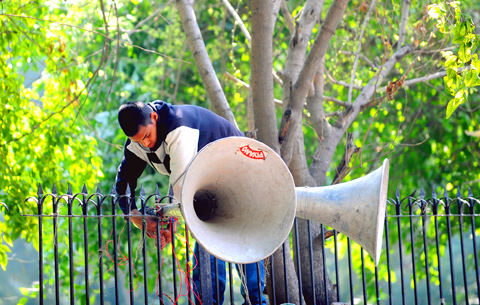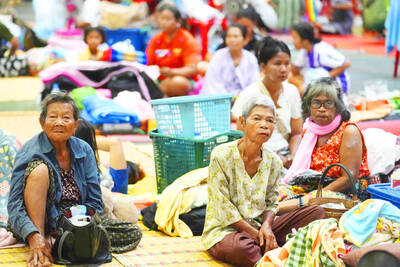By and large, Indians embrace noise. Their festivals are a riot of color and sound, weddings an exercise in high-decibel exuberance and house parties an extreme test of neighborly tolerance.
Now, however, things have reached such a pitch that the government has decided to step in, beefing up decade-old noise pollution regulations to keep the volume dial turned down.
“Stress has been laid on making the night peaceful,” the Environment Ministry said last month as it published a set of guidelines specifying when violations should be considered serious enough to merit police action.

PHOTO: AFP
The guidelines cover a variety of noise sources from construction sites and car horns, to living-room stereos and festive firecrackers.
The noise limit in residential neighborhoods is set at 45 decibels at night and 55 decibels in the day — roughly equivalent, respectively, to the noise produced by soft and loud conversation.
Anyone found to be producing noise in excess of those limits by more than five decibels should face sanction from police.
“These will give enforcing agencies more powers to implement rules as they are clear, precise,” J.S. Kamyotra of the Central Pollution Control Board (CPCB) said.
Privately, some officials admit that enforcing regulations is a much harder task than drafting them.
“Lets face it, we have been trying to stop people from smoking in public places and it hasn’t worked,” a senior control board official said on condition of anonymity. “There are laws, fines and punishments, but people always find a way to work around them and if a policeman tries to shut down loudspeakers at a religious event, he risks being lynched for daring to offend religious sentiments.”
Such skepticism is backed by the fact that no one has ever been convicted under the 2000 Noise Pollution Control Act — which promises seven years’ imprisonment to proven offenders.
With its billion-plus population, multiple religions and extraordinary social diversity, India is an almost limitless source of different, and often very loud, sounds — as any first time visitor to the country can testify.
“We Indians are a noisy lot, be it loud weddings or honking on the streets,” Delhi’s chief minister Sheila Dikshit said during a recent conference on environmental health risks.
“Silence talks to us. We do not realize this because of the amount of noise that surrounds us and noise pollution is a major problem,” Dikshit said.
Displays of wealth, power, happiness and religious faith take place, more often than not, with a high-decibel accompaniment.
“I had a rich neighbor who celebrated his son’s wedding in a park in front of my house. The music was simply deafening,” said an Indian government official, who did not want to be named. “When I asked him to turn it down as it was close to midnight, he refused, saying his son would get married only once and he didn’t want to mar the celebrations.”
During celebrations last year for Diwali, the Hindu festival of lights, the CPCB registered noise levels in some New Delhi residential areas as high as 85 decibels, which can result in permanent hearing loss after sustained exposure. Background traffic noise in Delhi can average between 85 and 100 decibels during the day.
Dipankar Gupta, a former sociology professor at Jawaharlal Nehru University in Delhi, said the growth of private incomes in India had only added to the din.
“In India, as in many developing countries, people think making a noise is their prerogative,” Gupta said. “With rising affluence, India has become more and more noisy because noise is unfortunately associated with status and power. The children of the rich and powerful think its fashionable to make the most noise.”
Environmental activists say politicians often set an appalling example, hosting or attending rallies where loudspeaker volumes are ramped up to maximum.
“Politicians assume they are exempt from the law and the police often don’t take action against them,” said Sumaira Abdulali, head of the voluntary group Awaaz (Noise) based in Mumbai. “It is only through citizens’ vigilance that we have seen a decrease in noise levels from political functions in Mumbai, but this is an uphill struggle when the law breakers are those who are supposed to be enforcing the law.”

FOREST SITE: A rescue helicopter spotted the burning fuselage of the plane in a forested area, with rescue personnel saying they saw no evidence of survivors A passenger plane carrying nearly 50 people crashed yesterday in a remote spot in Russia’s far eastern region of Amur, with no immediate signs of survivors, authorities said. The aircraft, a twin-propeller Antonov-24 operated by Angara Airlines, was headed to the town of Tynda from the city of Blagoveshchensk when it disappeared from radar at about 1pm. A rescue helicopter later spotted the burning fuselage of the plane on a forested mountain slope about 16km from Tynda. Videos published by Russian investigators showed what appeared to be columns of smoke billowing from the wreckage of the plane in a dense, forested area. Rescuers in

‘ARBITRARY’ CASE: Former DR Congo president Joseph Kabila has maintained his innocence and called the country’s courts an instrument of oppression Former Democratic Republic of the Congo (DR Congo) president Joseph Kabila went on trial in absentia on Friday on charges including treason over alleged support for Rwanda-backed militants, an AFP reporter at the court said. Kabila, who has lived outside the DR Congo for two years, stands accused at a military court of plotting to overthrow the government of Congolese President Felix Tshisekedi — a charge that could yield a death sentence. He also faces charges including homicide, torture and rape linked to the anti-government force M23, the charge sheet said. Other charges include “taking part in an insurrection movement,” “crime against the

POINTING FINGERS: The two countries have accused each other of firing first, with Bangkok accusing Phnom Penh of targeting civilian infrastructure, including a hospital Thai acting Prime Minister Phumtham Wechayachai yesterday warned that cross-border clashes with Cambodia that have uprooted more than 130,000 people “could develop into war,” as the countries traded deadly strikes for a second day. A long-running border dispute erupted into intense fighting with jets, artillery, tanks and ground troops on Thursday, and the UN Security Council was set to hold an emergency meeting on the crisis yesterday. A steady thump of artillery strikes could be heard from the Cambodian side of the border, where the province of Oddar Meanchey reported that one civilian — a 70-year-old man — had been killed and

POLITICAL PATRIARCHS: Recent clashes between Thailand and Cambodia are driven by an escalating feud between rival political families, analysts say The dispute over Thailand and Cambodia’s contested border, which dates back more than a century to disagreements over colonial-era maps, has broken into conflict before. However, the most recent clashes, which erupted on Thursday, have been fueled by another factor: a bitter feud between two powerful political patriarchs. Cambodian Senate President and former prime minister Hun Sen, 72, and former Thai prime minister Thaksin Shinawatra, 76, were once such close friends that they reportedly called one another brothers. Hun Sen has, over the years, supported Thaksin’s family during their long-running power struggle with Thailand’s military. Thaksin and his sister Yingluck stayed